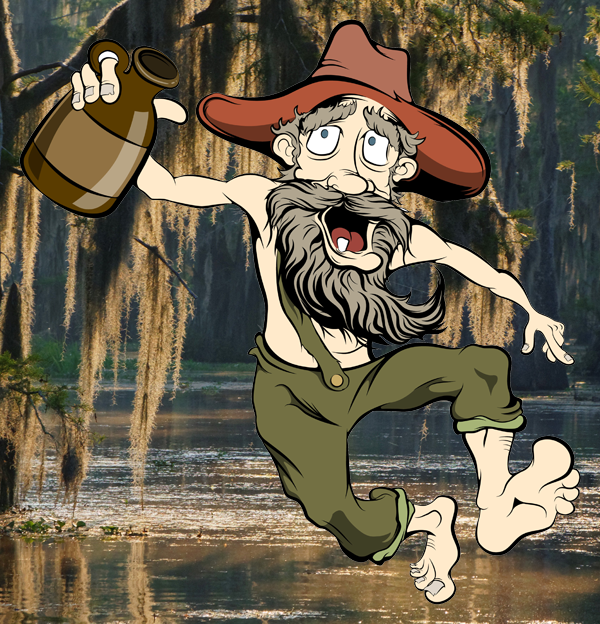
Pappy Dubois and the Birth of Cajun Cable
Deep in the heart of the Louisiana bayou, where the moss hung low and the gators ruled supreme, there lived a man named Pappy Dubois. Pappy’s camp, perched precariously on stilts above the murky water, was so remote that even the mosquitos had to send out scouting parties before finding him. The only way to get there was by a rickety pirogue that Pappy had named The Swamp Queen. For years, Pappy lived contentedly among the cypress trees, his days filled with crawfish boils, swamp fishing, and serenading the swamp critters with his accordion. But as the years rolled on, Pappy grew weary of the same old entertainment—gator wrestling, coon counting, and his cousin Remy’s dubious ghost stories. Pappy yearned for something more. He had heard tales of magical boxes called televisions that brought moving pictures right into people’s homes. The problem? None of the cable companies were willing to lay lines out to Pappy’s camp. When he called Bayou Broadcasting, the operator laughed so hard she had to put him on hold. GatorVision told him they’d only service his area if the gators agreed to stop chewing on their cables. Even SwampNet, which prided itself on rural coverage, politely declined after realizing they’d need a helicopter just to drop off the equipment. “Well, shoot,” Pappy muttered, tossing his straw hat onto the table. “If they won’t bring the TV to me, I’ll bring it to the swamp!”
The Swamp Solution
Now, Pappy wasn’t much for book learning, but what he lacked in formal education, he made up for in swamp ingenuity. He started by bartering with old Thibodeaux, who had a knack for fixing things that shouldn’t work in the first place. Together, they scavenged parts from abandoned shrimp boats, broken airboats, and even an old jukebox that had sunk into the bayou years back. Their goal? To build the first-ever cable network that could withstand the swamp. “What we need,” Pappy explained, “is cables that gators can’t chew, poles that won’t sink, and a signal strong enough to blast through a hurricane.” Thibodeaux scratched his beard. “What we need is gumbo first. Then we’ll figure it out.” Fueled by steaming bowls of Thibodeaux’s legendary andouille gumbo, the two got to work. They coated their cables in a special mix of hot sauce and cayenne pepper to deter gators. Pappy called it “Gator Guard.” For poles, they used reinforced cypress wood, ‘cause nothing in the swamp outlasted cypress. And for the signal? Pappy climbed the tallest tree he could find and strapped a salvaged satellite dish to the top. When he finally got a signal, the first channel he picked up was a rerun of Gilligan’s Island. “We did it, Thibodeaux!” Pappy hollered, nearly falling out of the tree. “Now let’s bring this here television magic to the people of the bayou!”
Cajun Cable is Born
Word spread faster than a swamp fire. Folks paddled in from miles around to see Pappy’s miraculous invention. He called his company Cajun Cable, and his motto was simple: “If we can’t reach ya, you’re probably living in a tree.” Pappy set up his headquarters at the local bait shop, where he and Thibodeaux installed the first official Cajun Cable customer—Miss Lulu LeBlanc. Lulu had been longing to watch her soaps ever since she’d moved out to the bayou with her fifty-seven cats. “Oh, Pappy, you’re a saint!” Lulu exclaimed, clutching his hand as her TV flickered to life. “Now I can see what that no-good Victor’s up to on The Restless Bayou.” From there, business boomed. Pappy and Thibodeaux hired a ragtag crew of swamp dwellers to help expand the network. There was Boudreaux the Frog Whisperer, who had a knack for calming critters while they installed poles. And there was Marie, a no-nonsense woman who could paddle a pirogue faster than a motorboat. Together, they braved snakes, gators, and the occasional ghost to bring cable TV to every corner of the swamp.
Challenges in the Bayou
Of course, running a cable company in the bayou wasn’t without its challenges. One day, a particularly bold gator named Big Louie decided to test the limits of Pappy’s Gator Guard cables. When the signal went out, half the bayou showed up at Pappy’s camp, demanding answers. “Now, y’all listen here,” Pappy said, standing on his porch with a pot of hot gumbo in one hand and a ladle in the other. “We’re gonna fix this faster than a coon can climb a tree. Y’all just sit tight and have some gumbo while you wait.” Big Louie was eventually relocated to a less disruptive part of the swamp, and the cables were reinforced with an extra layer of hot sauce for good measure. The customers, placated by free gumbo, left happy and slightly sweatier from the spice.
A Legacy in the Swamp
Over time, Cajun Cable became more than just a cable company. It was a lifeline for the bayou folk, connecting them to the outside world while preserving their unique way of life. Pappy even started his own channel, Bayou TV, featuring swamp news, live gator feedings, and Thibodeaux’s cooking show, Gumbo Galore. Pappy Dubois became a legend in his own right. People would paddle from miles around just to shake his hand and hear the story of how he brought cable TV to the swamp. And Pappy? He always had time for a story, a bowl of gumbo, and a laugh. When asked how he managed to build an empire from a little shack in the bayou, Pappy would just chuckle and say, “Well, cher, if you can outsmart a gator, you can outsmart anything.” And so, the tale of Pappy Dubois and Cajun Cable became part of bayou lore, a reminder that with a little ingenuity and a lot of gumbo, anything is possible—even in the heart of the swamp.
